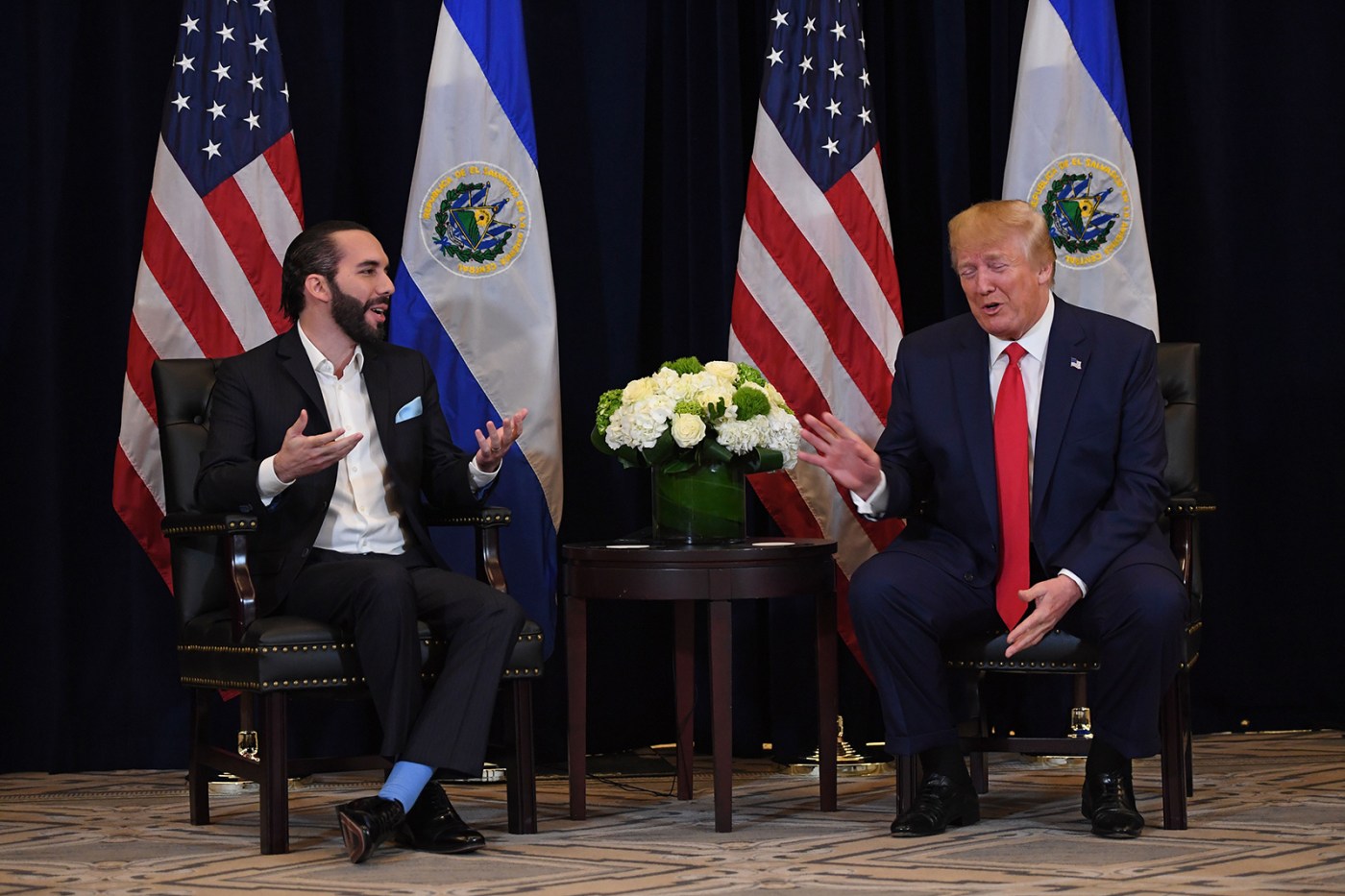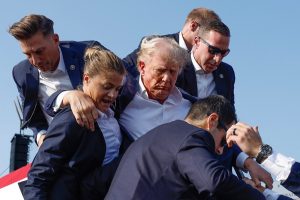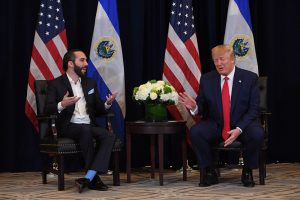
Trump’s foreign strategy still rests heavily on courting autocrats
Tracy Wilkinson | (TNS) Los Angeles Times
SAN SALVADOR, El Salvador — When El Salvador’s autocratic president, Nayib Bukele, celebrated his inauguration this summer, guests of honor included Donald Trump Jr., Tucker Carlson and Rep. Matt Gaetz, the firebrand Republican from Florida.
The right-wing celebrities attended the swearing-in ceremony at the Salvadoran National Palace, joined in the sumptuous black-tie dinner that followed and posed for numerous photos with Bukele, who wore a gold-embroidered black suit somewhere between a military uniform and a Nehru jacket.
“I came because something remarkable is happening here,” Carlson later gushed to Bukele during an interview for the former Fox News host’s podcast.
“You’re the most popular elected official in the world — provable fact,” Carlson added as the two sat amid elephant ear plants on Bukele’s verdant patio.
“Honored to be at @nayibbukele ‘s inauguration to support a leader willing to fight the globalist for the benefit of his people,” Trump Jr. wrote on Twitter, now known as X, after emerging from a one-on-one meeting at the palace with Bukele. “We need more like him.”
That Bukele’s June 1 assumption of a second term was unconstitutional until he had loyalists craft an exception did not seem to bother these guests. Nor apparently did Bukele’s record of human rights abuses, repression of dissent and tinkering with democracy.
The high-profile support for Bukele fits a broader effort by former President Donald Trump to build a network of like-minded allies across the globe in preparation for what he hopes will be a second term.
It’s in many ways a continuation of the precedent-breaking, Western-world-order-busting policies that Trump pursued in his first. As president, Trump heaped scorn on faithful U.S. allies, like Germany’s Angela Merkel, and embraced autocrats, like Russia’s Vladimir Putin, North Korea’s Kim Jong Un and Honduras’ Juan Orlando Hernandez, who is now serving a 45-year sentence in U.S. federal prison for drug trafficking.
Since losing the 2020 presidential race, Trump and his allies have continued to court such foreign leaders, including several who would likely not get red-carpet treatment in a Democratic-controlled White House.
There’s the proudly illiberal Hungarian President Viktor Orbán, who has met with the elder Trump at his Mar-a-Lago resort in southern Florida on a number of occasions.
Orbán, who has governed Hungary for nearly a quarter-century, has empowered himself to rule by decree, ignore parliament and use taxpayers’ money to spread disinformation, especially about migrants, LGBTQ people and other democracies.
He is alone in the 27-nation European Union to openly admire and endorse Trump, and it’s mutual. Trump has repeatedly praised Orbán as “a great man, a strong man.”
Along with Bukele, both controversial leaders — as well as Argentina’s president, Javier Milei — spoke at this year’s convention of the U.S. Conservative Political Action Conference, or CPAC, an annual must-do event for the right, now largely seen as an arm of the Trump campaign.
By contrast, the Biden administration sent only a medium-level delegation to the Bukele inauguration.
Members of the Biden administration have accused Bukele of undermining El Salvador’s key democratic institutions, including the judiciary and legislature. Bukele has ruled using emergency powers that allow for arbitrary detention and indefinite suspension of numerous civil rights.
Foreign policy experts say cozying up to autocrats helps legitimize them, and robs the U.S. of moral authority on the world stage.
“Every time we embrace a dictator, it makes it much more difficult the next time we try to support democracy,” said Benjamin Gedan, a former National Security Council official now at the Wilson Center.
Trump and his envoys say they are finding common ground with many foreign leaders who have been frustrated by Biden administration efforts to impose liberal values in their countries, such as gay, transgender and reproductive rights, said Matt Schlapp, chairman of CPAC.
“These are other countries that are facing some of the same challenges … we are fighting in America,” Schlapp said. These include a “wholesale attack on the family and traditional understanding of gender.”
Schlapp, who also attended the Bukele inauguration, added, “When I heard his themes, I thought it was beautiful: family. God.”
Schlapp says there is high demand overseas these days for Trump appearances. “We’re being asked for videos of Trump, for others close to Trump to come,” he said.
Another key figure in keeping Trump’s global flame alive has been Richard Grenell, whom Trump has continued to call “my envoy” long after both were out of office.
Best remembered as Trump’s ambassador to Germany, he is often mentioned as a possible secretary of State if Trump is elected.
Earlier this year Grenell was in Guatemala following that country’s presidential election. Guatemalan voters had chosen a leftist anti-corruption crusader, Bernardo Arevalo, over the establishment’s more conservative candidate. Right-wing forces were trying to prevent Arevalo from taking office.
Grenell openly and assertively supported efforts to block Arevalo, even as the Biden administration and much of the international community fought for a peaceful transfer of power.
Many of the foreign leaders Trump is courting are equally interested in ties with the GOP presidential nominee.
Bukele paid hundreds of thousands of dollars through an Argentine PR/lobbying firm listed by the Foreign Agents Registration Act to attract Trump acolytes to El Salvador and to present a positive image of himself in support of Trump in the U.S., according to the Salvadoran news site El Faro.
On July 4, Bukele used social media to congratulate the American people on Independence Day. But his message appeared tailored to a conservative U.S. audience, hearkening to previous times.
“We are inspired by you,” Bukele wrote, “not by the ideals you hold now, but by the ideals you had in 1776 when you gained your freedom and built the foundations of your great country.”
But alliances with autocrats can be problematic for both sides — as Bukele has since found out.
For all the effort Trump, his family and his advisors put into courting Bukele, the former president publicly mocked the Salvadoran leader last month during a speech at the Republican Party convention.
Trump dismissed Bukele’s claim to have lowered El Salvador’s murder rate through careful policy, saying El Salvador is simply sending its worst criminals into the U.S.
Bukele shrugged it off: “Taking the high road,” he tweeted.
©2024 Los Angeles Times. Visit at latimes.com. Distributed by Tribune Content Agency, LLC.


